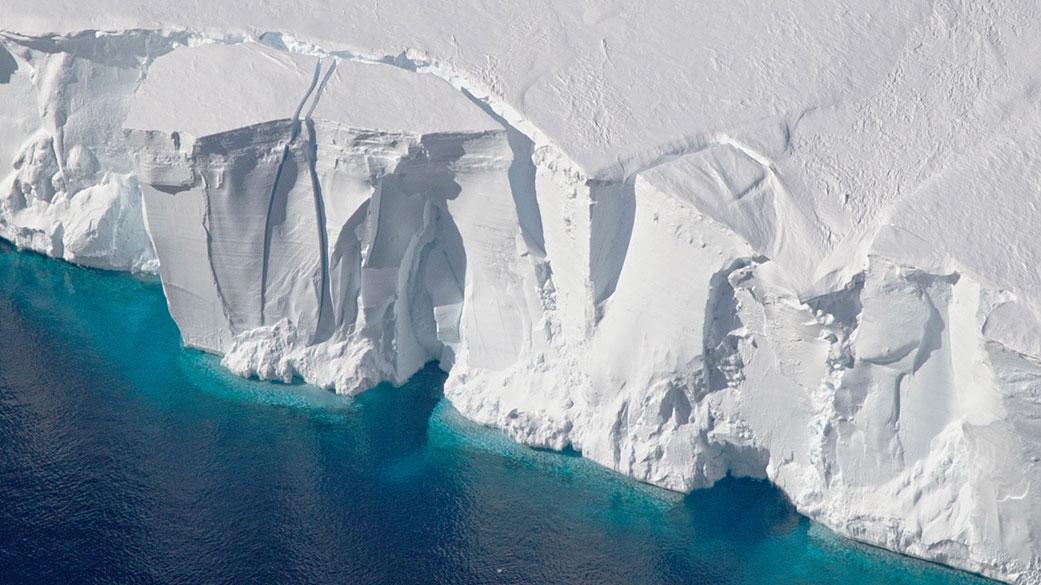Climate change alarm bells are ringing
- By Mitchell Blatt
 0 Comment(s)
0 Comment(s) Print
Print E-mail China.org.cn, November 13, 2023
E-mail China.org.cn, November 13, 2023

The 200-foot-tall (60-meter-tall) front of the Getz Ice Shelf in Antarctica is scored with cracks where icebergs are likely to break off, or calve, in this 2016 photo. [Photo/NASA]
In her novel "A Tree For Antarctica," author and environmentalist VJ Michaux imagines a future 300 years from now when nearly every corner of the globe is facing large-scale environmental climate disasters.
The oceans are rising. Millions and millions are being displaced and herded into makeshift refugee camps. Natural disasters come about so quickly that many end up being stranded on mountains that have been turned into islands and must be rescued by pilots from the International Rescue Corps. Dal is one such pilot who, just as he's thinking about retiring, is recruited by a wealthy industrialist-turned-philanthropist to fly trees to Antarctica and plant them in an effort to reverse the catastrophic human-caused warming.
Could that future ever come to pass? The novel has been sensationalized to make for a more compelling read, obviously. But when it comes to dystopian fiction, it is not as far-fetched as many others.
Antarctica is, in fact, warming at a record pace. In fact, according to research published in the journal Nature Climate Change, Antarctica is warming at twice the rate of the rest of the world. The rest of the world, for that matter, is also warming at a breakneck pace.
The research into Antarctica was extensive and robust. Scientists gathered nearly 80 ice core samples, enough to allow them to extrapolate the temperature going back 1,000 years. They found the frozen continent is warming at a rate of up to 0.32 degrees Celsius per decade. That is about 70% faster than predicted by models.
Because Antarctica is 97.6% ice, the rapid warming is extremely concerning. West Antarctica, the region that contains the peninsula that stretches north to within 1,000 kilometers of South America, is the most vulnerable. If the largest ice sheets there melt, they would push the sea level up by multiple meters.
"Our models might be underestimating the loss of ice that we might get," Dr. Sarah Jackson said.
West Antarctica is where some of the drama in the book plays out. On some of the islands off the coast of the peninsula, grasses can be seen growing that aren't covered with continuous year-round frost. Fossil records show clumps of trees that used to live there 100 million years ago.
The warming that is happening now, however, is almost entirely caused by human activity. According to Carbon Brief, the fifth assessment (2013) of the Intergovernmental Panel on Climate Change (IPCC) found that 100% of the increase in global temperature since 1950 was caused by the burning of fuel and other human actions.
Dr. Gavin Schmidt, a scientist who works for the National Aeronautics and Space Administration (NASA) of the United States, specifically estimated the human contribution to climate change as being somewhere between 72% to 146% of the increase in temperature, with the possibility that natural cycles are cooling the planet.
If the worst-case scenarios do come about, the habitable regions for plants and animals will change dramatically. Some species will be wiped out. Harmful invasive species will move to new regions and spread unchecked. Farmers will lose the ability to farm in long-held plots of land. Regions will experience famines. If the warming accelerates, it may happen too quickly for farmers to research and switch to new crops.
The tragedy of "A Tree For Antarctica" is that we've all known this future was a possibility for years. Even a future that is significantly less extreme would still cause forced relocation, heat stroke, extreme cold, destructive superstorms, and more suffering and deaths for many.
The alarm bells are ringing. The scientists are putting out new research all the time. Will we listen and act, or will we end up in a world not much different from what VJ Michaux imagined?
Mitchell Blatt is a columnist with China.org.cn. For more information please visit:
http://www.keyanhelp.cn/opinion/MitchellBlatt.htm
Opinion articles reflect the views of their authors, not necessarily those of China.org.cn.





